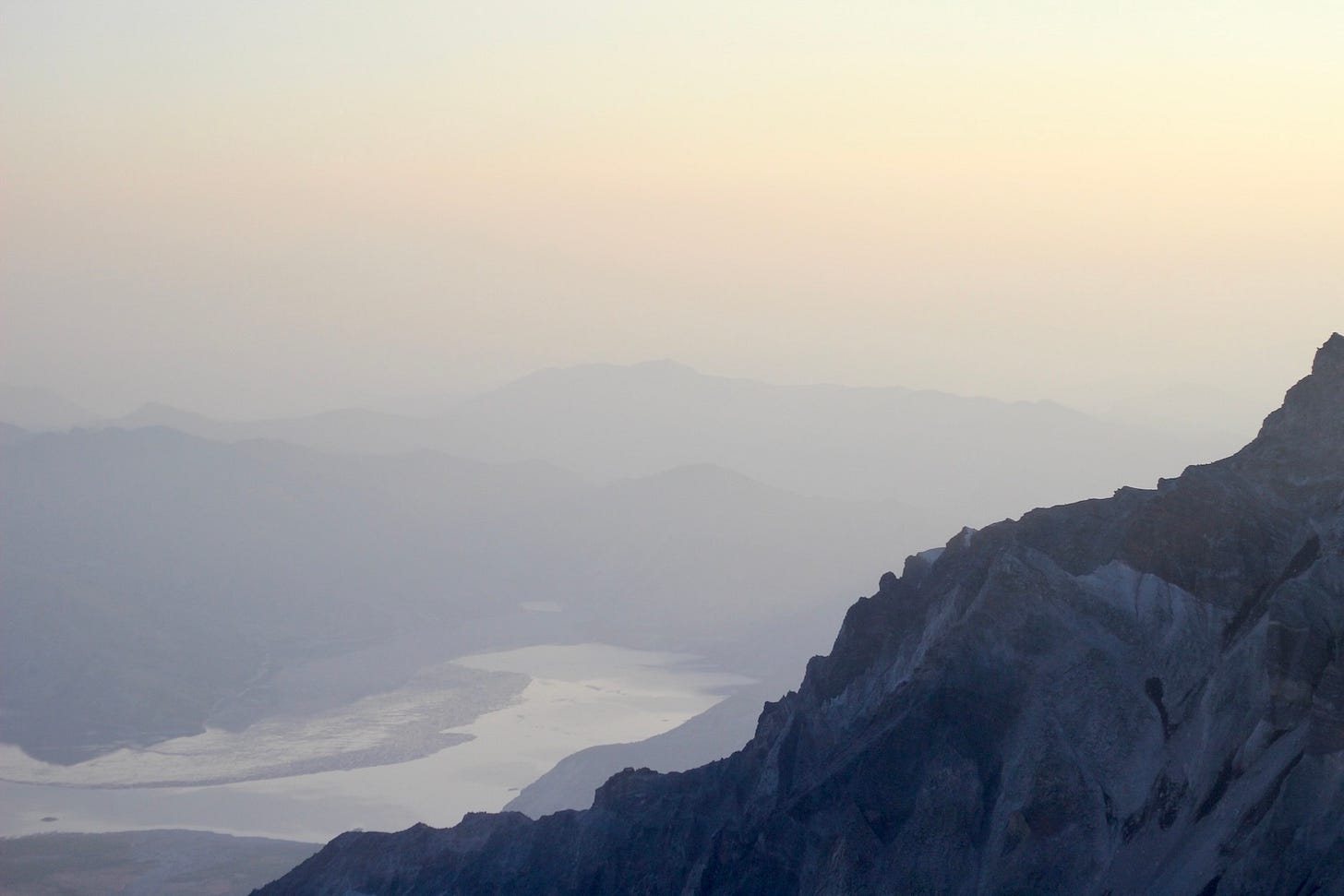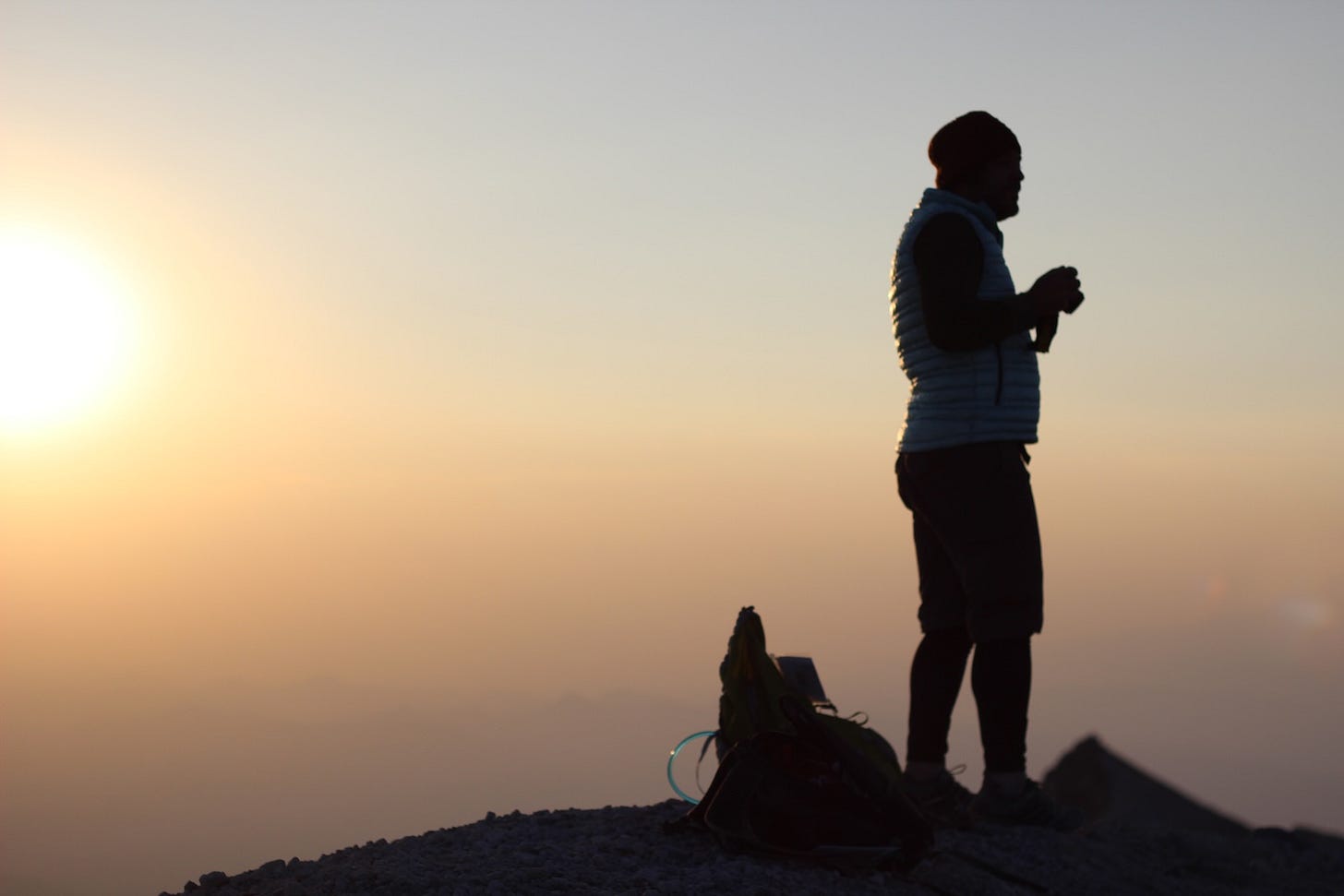A Search for Solid Ground
Looking for love and home on a volcano
Happy Friday, writer friends! Today I’m sharing a little bonus essay. Surprise! I wrote this ten years ago, back when I had recently moved to Portland, Oregon and was trying to decide if I would make it my home for awhile. Having spent the last decade doing just that—and then moving away—it’s strange and sweet to look back on this time in my life when everything felt so unsteady. I never would have guessed, standing at the edge of a volcano’s smoking mouth, that I would one day run the circumference of that same volcano with my husband and daughter waiting for me at the finish line.
I hope you enjoy this little throwback piece.
Stay inspired,
Britany
A nearly vertical wall of sand can barely support itself, let alone the weight of a human being. Yet here I was, fingers knuckle deep in scree, toes gripping a bowling ball-sized rock that shifted with my every breath.
“I’m going to check for a better path over here. You stay put.” My hiking partner’s voice sounded distant already. The swinging strip of illumination from J’s flashlight swept away from me, towards what we hoped was the correct line of boulders to safely traverse this incline.
It was 3 a.m. on the side of Mt. St. Helens. We’d lost sight of the wooden poles that were meant to keep us on the trail and wandered into a steep field of loose rocks not meant for crossing.
I’d met J just two weeks prior to my suggestion that he join me in climbing Mt. St. Helens. We connected over keyboards but sat just inches from each other at the neighborhood coffee shop where I spend most afternoons.
“What are you working on?” he asked enthusiastically, his unruly brown curls reaching towards the ceiling as if searching for the ideas that flowed from his fingers.
“Oh! Nothing interesting,” I answered, slightly startled by his confident approach.
“No? What do you do?”
“I’m a writer. But right now, I’m not writing. I’m just invoicing.”
Could I have picked a more boring response? Feeling compelled to make up for my lack of conversation skills, I asked, “And what are you working on?”
He told me that he was also a writer but was unfortunately stuck reading students’ work at the moment. He went on to describe his more interesting endeavors. He was an author with two books.
There was something formal yet slightly frenzied in the way he spoke. He presented himself in a way that made it all seem significant.
I liked him immediately. But when our conversation finally led to him asking for my number, I hesitated.
Since relocating from New York City to Portland, Oregon, dating had become my primary mode of socializing. Latching on to the modern practice of using apps and websites for meeting people had allowed me to shamelessly experience a city through a screen. With boxes still towering next to my couch, I’d curl up with my phone and swipe left, left, left, right… then wait for the opportunity to get out and experience something beyond my bare walls, with the additional thrill of potential romance.
I’d pluck outfits from piles of clothes that still needed hangers. Blinking into my mirror with tape still protecting its edges, I’d press red between my lips, then wonder what this next person I’d never met would see.
The first brought me to a brewpub where he regaled me with insider knowledge of Portland’s famous beer scene. He had never lived outside of Portland and looked more speculative than impressed when I rattled off the cities I’d recently called home.
I declined his offer for a third beer and returned to my apartment, where I kicked off my regrettable choice in heels and swiped some more before falling asleep.
The second, coincidentally, brought me to the same place. He lived with his parents and didn’t share any ambitions to change that. At the end of the date, I hugged him and said I had a good time, then hoped he wouldn’t follow up.
By the third… fourth… fifth… I’d been to that same brewpub three times and never let on that it wasn’t a new, exciting experience. My sides of the conversation became scripted. I’d just moved here from New York City. I loved to travel. Yes, I hike and drink beer, just like everyone else in this town.
It was through these dates that I’d begun to piece together a sense of Portland through the eyes of brief acquaintances. The restaurants, the bars, and that apparently very popular brewpub were like entries in a guidebook to a place I hadn’t yet discovered. But flipping through a guidebook is no way to treat a new home.
I started to wonder if this city would be as fleeting as these dates for me, just like my passion for New York and Chicago had fizzled before I could call them home in meaningful ways, other than my mailing address.
Eventually, I took Tinder off my phone. I buried myself in work and waited for something to make me want to stay here. And if nothing did? I could always leave. Moving fast was often safer than dawdling on loose ground, anyhow.
Sitting there in the presence of his eager smile, I gave him my number. What the hell.
I met J at a cocktail bar I’d chosen myself later that week. Over whiskey sours, surrounded by the hushed crowd and soft music, I abandoned my script.
We talked about being new in town — about always being new in town and the excitement and loneliness that leads and follows perpetual motion. The path of J’s life was even more meandering than my own, and he rattled off cities and countries that had at one time or another been home. With our knees touching and our first glasses empty, J then told me that he’d only be here for three more weeks.
A month-long gig at a friend’s new bar brought him to Portland for the summer between school years. He was slinging drinks for a working vacation, visiting a city that many of his friends called home, and sleeping in one of their basements. He’d be packing up at the end of the summer to drive back East where he taught creative writing.
Of course, I thought, and returned to my drink with a sad slurp on my straw against naked glass.
*
J’s voice echoed against rock when he found the path. Slowly, I began side-stepping my way across the sandy incline, hopping from rock to rock before they had time to drop out from under me.
When I caught up with him, he was standing on sturdy boulders.
“Well, that was fun!” he exclaimed. I laughed nervously, sitting down on stable ground. The sky around us had shifted from nearly black to a dirty denim hue, finally allowing us to see the path that lay ahead.
Once my heartbeat settled, I had to agree. That had been fun.
I was delighted when he agreed to do this hike with me. It was an adventure I’d been craving since moving to the Pacific Northwest. Mount St. Helens white rounded roof would appear suddenly on sunny days from my apartment in the city, and my imagination would complete the peak that once pointed towards the clouds.
We don’t have volcanos back East. The thought of something so big erupting — sending these boulders we now stood on, rocketing upwards and tumbling back down — was thrilling and terrifying. The terrain of this side of the country was so dramatic and I was finally standing on it, rather than admiring the lines and shapes from a distance. I could feel the curve of each rock under my feet, even as they occasionally slid away.
Three hours later, we reached the top. With dizzying breaths, we high-fived on the rim, staring down into the smoking center. The edges of the hole were soft and orange in the haze of the early morning fog. I stood very still, remembering the park website’s instructions about not getting too close. People had fallen to their deaths trying to capture photos of themselves at the edge of the volcano’s mouth.
Then I backed away, inching over to J’s side and kissed him.
That weekend, we regaled his friends with our shared story while bar hopping in Southeast Portland, where patio picnic tables are littered with cigarette butts and withered slices of lime. I held his hand under a sticky booth while he described the experience of traversing that field of loose rock. His friends were impressed. But once the story was over, I found myself receding from the conversation, as it shifted to inside jokes and stories I wasn’t a part of. J caught my eye every time I started to feel awkward for being so quiet and offered me sweet smiles that his friends didn’t see. I wished I had more to say. But I didn’t know his friends. I barely knew him.
Back in my apartment after last call, we stretched out side-by-side on my couch, and I buried my head in his chest, hoping he couldn’t sense the sadness crawling up my own.
I wanted to ask him to stay in Portland, just as I’d always hoped someone would ask me—to stay anywhere. I wanted to hold on to this person in this city and make them both feel like home.
But I didn’t ask.
Our adventure had been fleeting, but I would have plenty more. Tiny, loose pebbles—pieces of this city and the people I would meet here—would accumulate and settle into solid ground. And while I might keep bouncing from rock to rock for some time, wondering when if the ground would suddenly slide away, I knew I’d eventually find my footing.
That’s why I didn’t push him to say “I can’t stay” when maybe he could, but wouldn’t.
That’s why I didn’t ask him if I was worth staying for. I would stay, and he would go. I would make Portland my home, and he would return to his.
Instead, I said, “I’ll miss you,” and he said, “I’ll miss you, too.” At least I knew that much was true.




